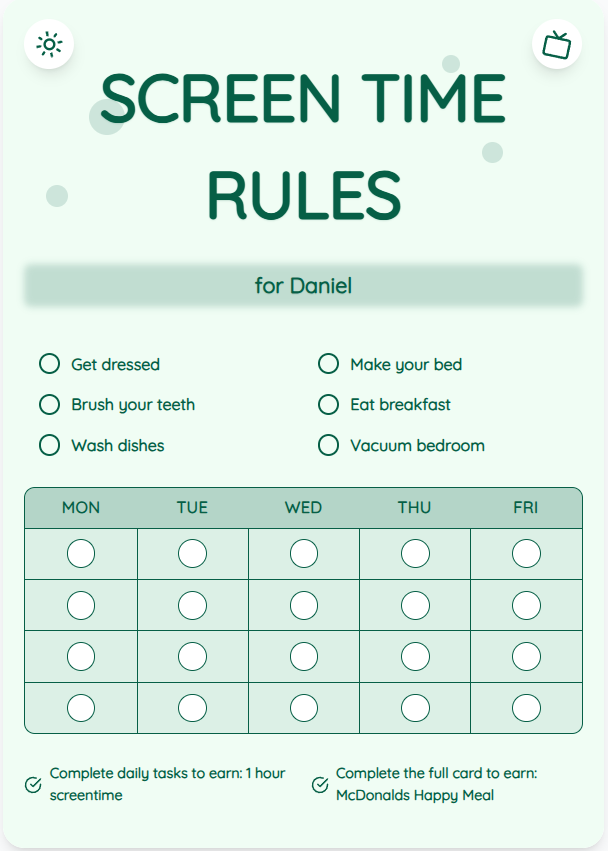Expert Guide: Screen Time Recommendations by Age from CDC
As a parent, navigating the world of screen time can be overwhelming. Understanding age-appropriate guidelines is crucial for your child's development. In this comprehensive guide, we break down the CDC's recommendations for screen time by age to help you create a healthy balance for your children.
See What Your Screen Time Chart Will Look Like
Here's an example of a beautiful, customizable screen time rules chart you can create for your family

Screen Time Guidelines for Toddlers (Ages 2-5)
For toddlers aged 2-5, the CDC suggests limiting screen time to 1 hour per day of high-quality programming. Encourage interactive activities and ensure screens don't interfere with sleep or physical activity. Use our screen time chart generator to create a personalized plan for your child.
Screen Time Limits for School-Aged Kids (Ages 6-12)
Children aged 6-12 benefit from consistent limits on screen time. The CDC recommends 2 hours or less of recreational screen time per day. Encourage breaks, outdoor play, and family time to balance screen use. Our screen time charts can help you track and adjust screen time effectively.
Put These Tips Into Action
Create a custom chart to implement these strategies with your child
Setting Up Screen Time Rules at Home
Establish clear rules around screen time at home. Create a family media plan that includes designated screen-free zones and times. Involve your children in setting limits and teach them about responsible screen use. Consistency is key to successful screen time management.
Practical Tips for Success
- Create a daily screen time schedule for your child.
- Use parental controls to limit access to inappropriate content.
- Encourage offline hobbies and activities.
- Lead by example by practicing healthy screen habits.
Frequently Asked Questions
How does excessive screen time affect children's development?
Excessive screen time can lead to issues such as sleep disturbances, obesity, poor academic performance, and behavioral problems in children. Setting limits and promoting a balanced lifestyle is crucial for their well-being.
What are signs that my child may be spending too much time on screens?
Signs include irritability when screens are taken away, declining academic performance, lack of interest in other activities, and disrupted sleep patterns. Monitoring their screen time and behavior can help you identify these signs early.
How can I encourage my child to reduce screen time without conflict?
Involve your child in creating screen time rules to promote their ownership and understanding. Offer alternative activities, set a positive example, and provide rewards for sticking to limits. Communicate openly about the importance of balance in their daily routine.
Managing screen time effectively is essential for fostering healthy child development and family harmony. By following the CDC's guidelines and implementing practical tips, you can create a balanced approach to screen use in your household. Visit ScreenTimeRules.com to generate personalized screen time charts for your children today!
Ready to Transform Your Family's Screen Time?
Join thousands of parents who have successfully managed screen time with our customizable charts.
